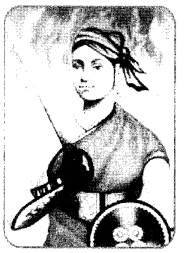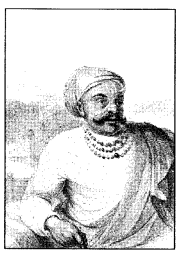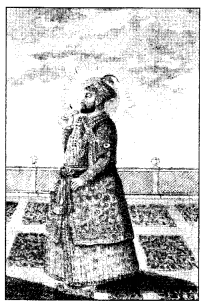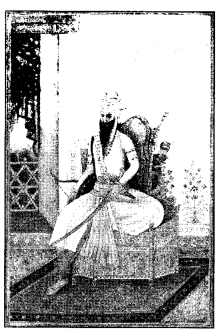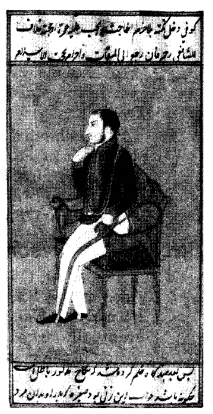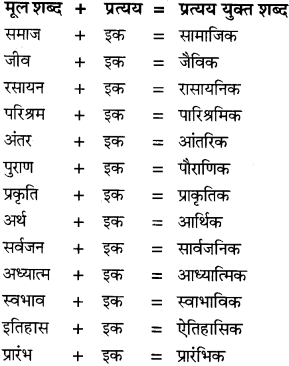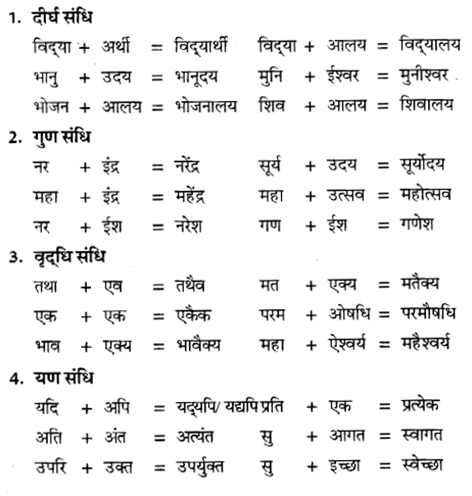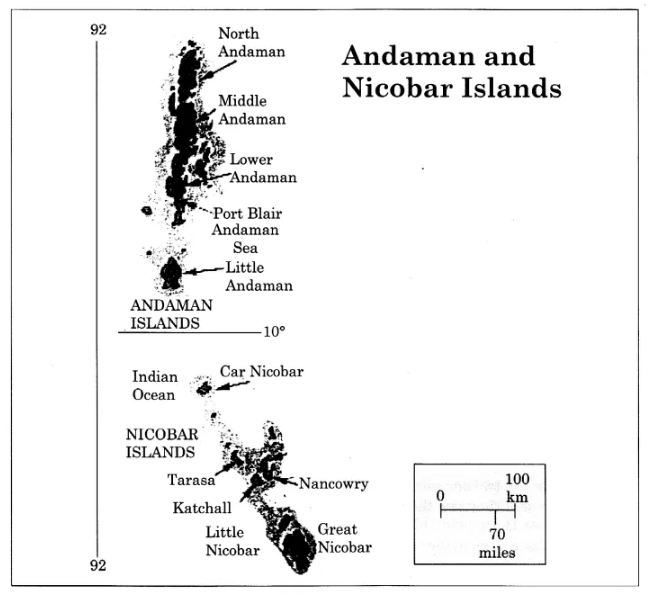NCERT Solutions for Class 8 Social Science Geography Chapter 5 Industries
These Solutions are part of NCERT Solutions for Class 8 Social Science. Here we have given. NCERT Solutions for Class 8 Social Science Geography Chapter 5 Industries
1. Answer the following questions.
Question 1(1).
What is meant by the term ‘industry’?
Answer:
The industry refers to economic activity that is concerned with the production of goods, extraction of minerals or the provision of services.
Question 1(2).
Which are the main factors which influence the location of an industry?
Answer:
Main factors which influence the location of an industry.
- Availability of raw materials
- Transport and communication
- Land
- Power
- Water
- Capital
- Labour
- Market
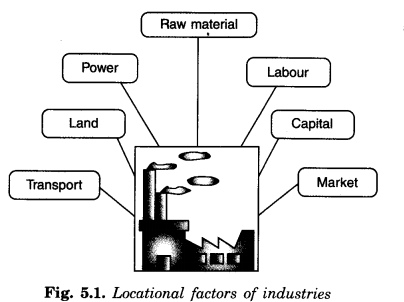
Question 1(3).
Which industry is often referred to as the backbone of the modern industry and why?
Answer:
The iron and steel industry is often referred to as the backbone of the modern industry because almost everything we use is either made of iron or steel or has been made with tools and machinery of these metals.
Question 1(4).
Why cotton textile industry rapidly expanded in Mumbai?
Answer:
The cotton textile industry has rapidly expanded in Mumbai because of the following favourable conditions
(a) Warm and moist climate
(b) Port for importing machinery
(c) Availability of raw materials
(d) Skilled labour
Question 1(5).
What are the similarities between the information technology industry in Bangalore and California?
Answer:
Some of the points of similarity between the information technology industry in Bangalore and Silicon Valley are:
- Educational and technological institutions: Bangalore has the largest number of educational institutions and IT colleges in India and Silicon Valley is also situated close to some reputed scientific and technological centers of the world.
- Environment: Both of Bangalore and Silicon Valley have low pollution levels and have a clean environment.
Question 2.
Tick the correct answer.
1. Silicon Valley is located in
(a) Bangalore
(b) California
(c) Ahmedabad.
2. Which one of the following industries is known as the sunrise industry?
(a) Iron and steel industry
(b) Cotton textile
(c) Information technology.
(3) Which one of the following is a natural fiber?
(a) nylon
(b) jute
(c) acrylic
Question 3.
Distinguish between the following.
(1) Agro-based and mineral-based industry
(2) Public sector and joint sector industry.
Answer:
(1) Distinction between Agro-based and Mineral-based Industry
| Agro-hased Industries | Mineral-based Industries |
| 1. The industries which obtain raw materials from agriculture are called agro-based industries. 2. These industries provide employment in rural areas. 3. Agro-based industries are mostly in private or co-operative sectors. 4. Examples: Jute, sugar, cotton textile, vegetable oil, and plantation. |
1. Industries based on minerals for their raw materials are termed mineral-based industries. 2. They provide employment both to rural and urban labour. 3. These industries are generally located in the public sector due to the huge investments involved. 4. Examples: Iron and steel industry, machine tools industry. |
(2) Distinction between Public Sector and Joint Sector Industry
| Public Sector Industry | Joint Sector Industry |
|
1. The industry which is owned and controlled by State Govt, or the Central Govt, is called Public Sector Industry. 2. Examples: Indian Railways, Steel plants at Durgapur, Bhilai, HMT, Heavy Electrical, etc. |
1. The industry which is owned and controlled by government and individuals are called joint sector industries. 2. Examples: Cement industries, paper industries, information technology, MUL (Maruti Udyog Limited). |
Question 4.
Give two examples of the following in the space provided.
- Raw Materials: Iron ore and limestone.
- End product: Iron and steel.
- Tertiary Activities: Transport and banking.
- Agro-based Industries: Sugar and vegetable oil.
- Cottage Industries: Basket making and weaving.
- Co-operatives: Sugar and Amul milk union.
Question 5.
Activity
How to identify a location for establishing an industry—
Divide your class into groups. Each group is a Board of Directors faced with the problem of choosing a suitable site for an iron and steel plant of Developer Dweep. A team of technical experts has submitted a report with notes and a map. The team considered access to iron ore, coal, water, and limestone, as well as the main market, sources of labour, and port facilities. The team has suggested two sites, X and Y. The Board of Directors has to take the final decision of where to locate the steel plant.
- Read the report submitted by the team.
- Study the map to find out the distances of the resources from each site.
- Give each resource a ‘weight’ from 1 to 10, according to its importance. The greater the ‘pull’ of the factor on the industry the higher the weight from 1 to 10.
- Complete the table below.
- The site with the lowest total should be the most satisfactory site.
- Remember each group of directors can decide differently.
Report
Factors/resources affecting the location of a proposed iron and steel plant on Developen Dweep.
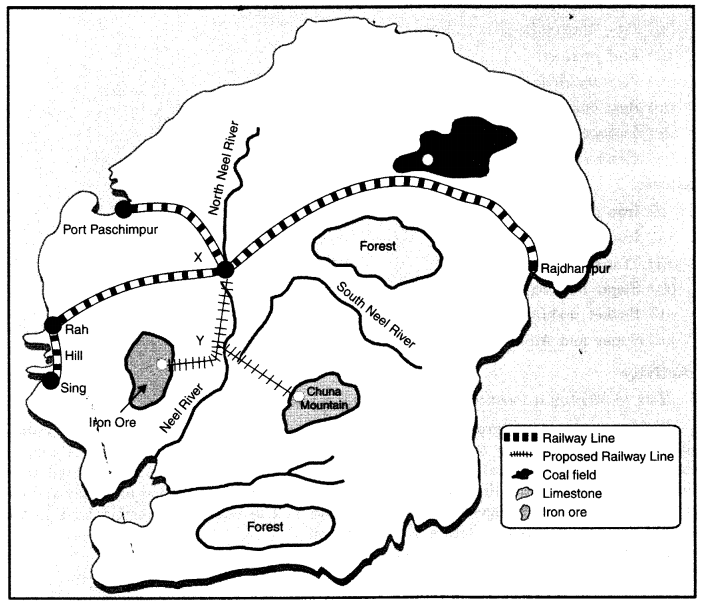
- Iron ore: This is a very large deposit of low-grade iron ore. Long-distance transportation of the ore would be uneconomic.
- Coal: The only coalfield that contains rich deposits of high-grade coal. Transportation of coal is by railway, which is relatively cheap.
- Limestone: This is widely available over the island, but the purest deposits are in the China Mountains.
- Water: Both the tributaries of River Neel carry sufficient water to supply a large iron and steel plant in all seasons. The seawater because of its high salt content is unsuitable.
- Market: It is expected that the chief market for the Plant’s products will be the engineering works of Rajdhanipur. Transport costs for the products—mainly small steel bars and light steel plates would be relatively low.
- Labour supply: This will have to be recruited mainly from the unskilled workers in
the 3 fishing villages of Hill, Rah, and Sing. It is expected that most workers will
commute daily from their present homes. - Port facilities: These are at present minimal. There is a good, deep natural harbour at port Paschimpur developed to import metal alloys.
| Resource | Distance from X | Distance from Y | Weighting 1-10 |
Distance V weight for site X | Distance x weight for site Y |
| Iron ore | 8 | 3 | 1 | 8 | 3 |
| Coal | 12 | 17 | 1 | 12 | 17 |
| Limestone | 11 | 6 | 2 | 22 | 12 |
| Water | 1 | 1 | 2 | 2 | 2 |
| Chief market | 20 | 25 | 5 | 100 | 125 |
| Labour supply | 8 | 13 | 3 | 24 | 39 |
| Total = | 168 | 198 |
The smaller the pull, the higher the weighting.
Answer:
Site X is more suitable.
We hope the NCERT Solutions for Class 8 Social Science Geography Chapter 5 Industries, help you. If you have any query regarding NCERT Solutions for Class 8 Social Science Geography Chapter 5 Industries, drop a comment below and we will get back to you at the earliest.


